Digital Payments
Digital technology is transforming the way we respond to emergencies. Innovations range from how we identifying people eligible for assistance, to data collection for assessments and monitoring, to communication with crisis-affected communities. Digital payment systems, including mobile devices, electronic vouchers, and cards – when used appropriately – can deliver timelier, more secure, more cost effective, and inclusive assistance. But as the volume of data we collect, store and share about people grows, we must ensure that our data protection systems keep pace and that we understand and mitigate for the risks inherent in new technologies.
Featured Content

Podcast: Is informed consent possible in humanitarian CVA?
Podcast
Episode 2 of the CashCast tackles data responsibility with Amos Doornbos, Linda Raftree, James Eaton Lee and Ric Tighe

Consent and Ownership in the Shift to Digital Cash and Voucher Assistance
Blog Post
Part of committing to cash and voucher assistance (CVA) is committing to going digital and collecting data. While they are two different things, they are deeply intertwined. And while an organisation can ‘go digital’ without cash programmes, it’s nearly impossible to commit to cash programmes in the long term without going digital. Yes, it is true we’ve done cash and voucher programmes...
Latest

Changes to US and UN economic sanctions may simplify CVA implementation
Blog Post
Recent changes to the UN and US economic sanctions regimes promise to improve cash transfer process across international borders, but changes might not be as quick or comprehensive as we would hope. We put eight questions to Rory Crew, who has looked into the matter for you.
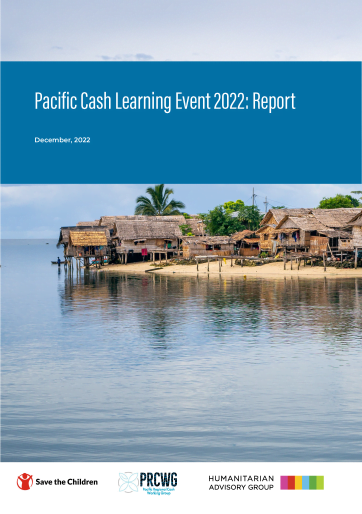
Pacific cash learning event 2022: Report
Report
The Pacific Cash Learning Event was held during an important time for the region. The Pacific is highly vulnerable to disasters, which are becoming increasingly frequent and intense as a result of climate change. These disasters threaten health, food and water systems and economic security, while the...
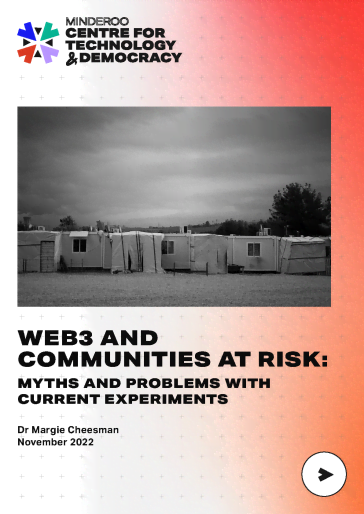
Web3 and Communities at Risk: Myths and Problems with Current Experiments
Report
The report demonstrates 3 key areas where Web3 experimentation from start-ups, humanitarian and development aid organisations, and other non-traditional commercial partners is targeting marginalised groups: Payment, Currency, and Identification.
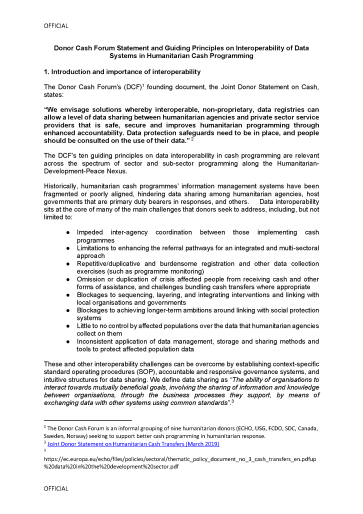
Donor Cash Forum Statement and Guiding Principles on Interoperability of Data Systems in Humanitarian Cash Programming
Policy paper
The DCF’s ten guiding principles on data interoperability in cash programming are relevant across the spectrum of sector and sub-sector programming along the Humanitarian- Development-Peace Nexus. The guiding principles outlined in this statement will build upon existing interoperability commitments to...

Supporting Digital Payments in Cash Programming
Case Study
This report is intended to assist the Norwegian Refugee Council (NRC) and other humanitarian actors to leverage digital payment systems such as mobile money in their humanitarian cash transfers. FSD Africa commissioned Strategic Impact Advisors (SIA) to examine the challenges and opportunities of...
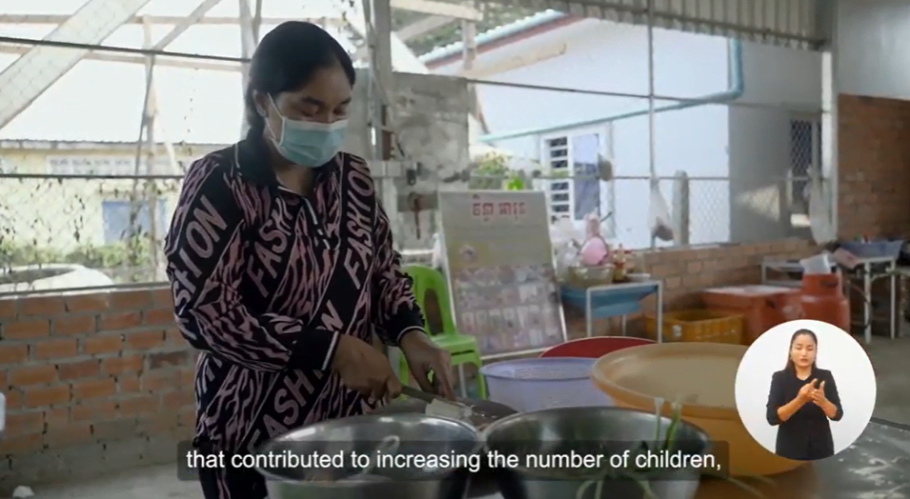
Out of Residential Care Institutions : building the capacities of vulnerable households to ensure family-based care during COVID-19
Video
A short video highlighting how cash and voucher assistance (CVA) transitioned to livelihood early recovery support to enable vulnerable households affected by the secondary impacts of COVID-19 to strengthen their capacity to care for their children and for youth living in Residential Care Institutions to...
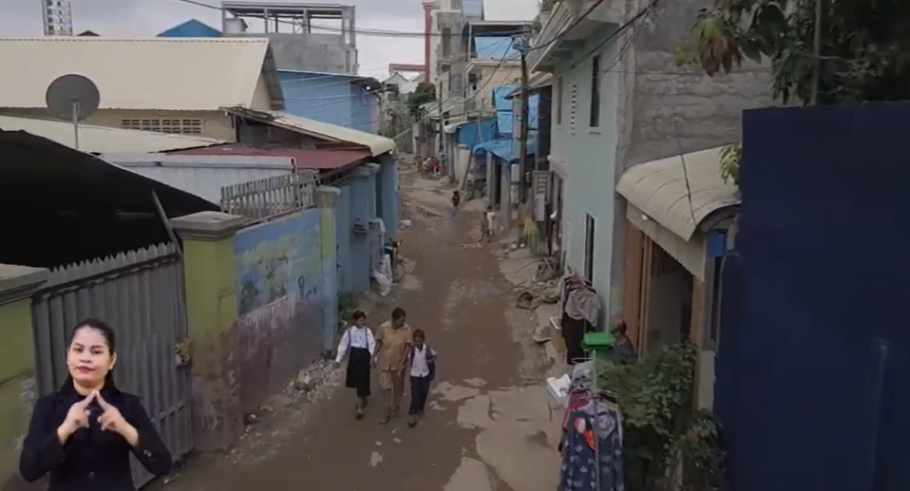
Cash Transfer
Video
A short video highlighting how cash and voucher assistance (CVA) achieved child protection outcomes for vulnerable households affected by the secondary impacts of COVID-19 and already receiving case management by child protection agencies, strengthening their capacities to cover their essential needs,...

Delivering Better Together: Standard Operating Procedures for Oxfam’s Approach to Cash and Voucher Assistance
Guidelines and Tools
Delivering Better Together: SOPs for Oxfam’s Approach to Cash and Voucher Assistance is a digital guide to all things cash and vouchers in Oxfam that can be downloaded to and accessed from a phone, tablet, or any other device. The SOPs focus on the basics of cash and vouchers, the use of it for...

Unlocking Digital Cash and Voucher Assistance: A Guide to Digital Options
Guidelines and Tools
Unlocking Digital Cash and Voucher Assistance: A Guide to Digital Options is designed to help CVA practitioners and decision makers to ask and answer important questions at various stages of the CVA project cycle, in order to systematically decide on the appropriate and relevant digital delivery...
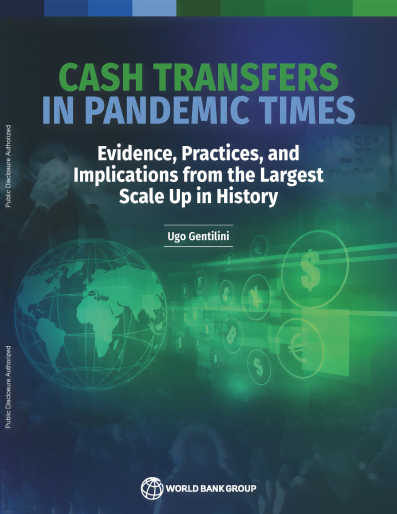
Cash Transfers in Pandemic Times
Report
This paper by Ugo Gentilini, brings together trends, evidence and practices generated over the course of the pandemic. The focus revolves primarily around social assistance in general and cash transfers in particular, with both anchored to the broader remit of social protection. The objective is to give a...
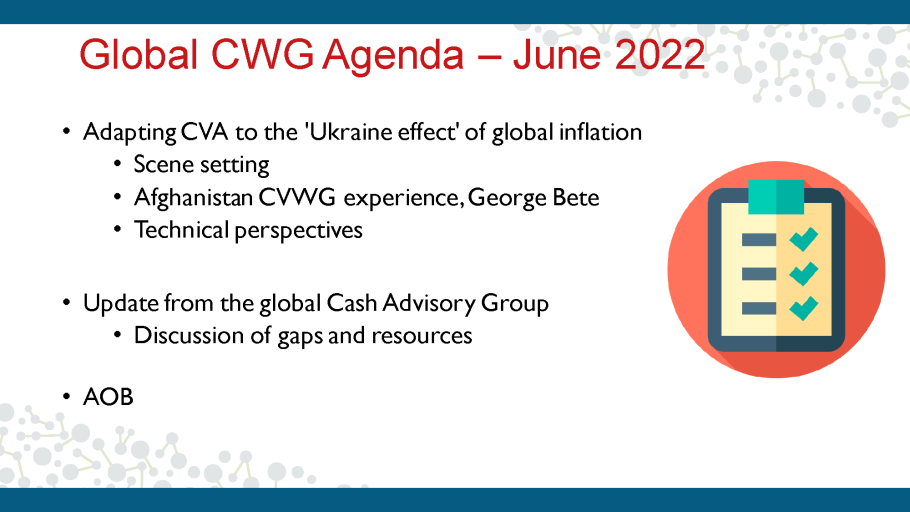
Global Cash Working Group Meeting – June 2022
Presentation
Slides from the Global Cash Working Group meeting on 29 June 2022. The agenda topics include: 1) Adapting CVA to the ‘Ukraine effect’, including experiences from Afghanistan; and 2) An update from the Cash Advisory Group, including next steps in terms of transition planning.

Digital Feast and Famine: Digital Technologies and Humanitarian Law in Food Security, Starvation and Famine Risk
Report
This working paper presents the findings of a brief exploratory study into the role of digital technologies in International Humanitarian Law (IHL) and its implications for starvation and famine risk. It is a work in progress, intended to raise issues rather than reach definitive conclusions (given the...

Geotargeting Analysis for Seasonal Assistance: Case study Chad
Case Study
This paper describes the methodology that was developed to address targeting gaps using remote sensing data, presents the results obtained using the methodology, and discusses the challenges in its utilisation.

Rapid Market Assessment in Warsaw
Report
Civilians in Ukraine continue to suffer the devastating consequences of the violence by the Russian invasion. Data indicated that at humanitarian corridors for civilians, artillery and missile strikes have continued and are increasingly targeting civilian infrastructure, leading to over 3.7 million...
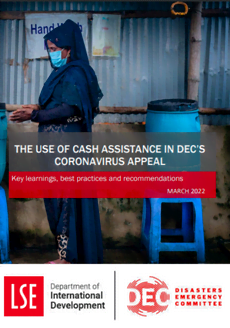
The Use of Cash Assistance in DEC’s Coronavirus Appeal: Key Learning, Best Practices and Recommendations
Report
The purpose of this report is to provide insight into the learnings, future improvements and best practices in cash programming. The 2020 DEC Coronavirus Appeal was analysed to determine the opportunities for collective learning about cash programming. The countries investigated include, Afghanistan,...
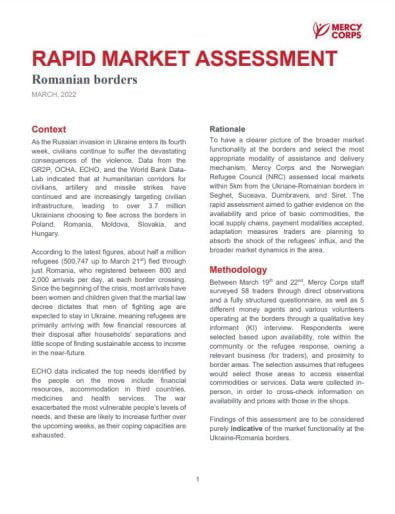
Rapid Market Assessment at Romanian border crossings
Report
As the Russian invasion in Ukraine enters its fourth week, civilians continue to suffer the devastating consequences of the violence. According to the latest figures, about half a million (500,747 up to March 21st) fled through just Romania, with registered between 800 and 2,000 arrivals per day, on each...

DG ECHO Thematic Policy Document on Cash Transfers
Policy paper
DG ECHO released its Thematic Policy document on Cash Transfers in March 2022. The document provides guidance primarily to DG ECHO’s partners and staff, but also to the wider cash community with the objective of collectively enhancing the quality and efficiency of cash programmes and of humanitarian...
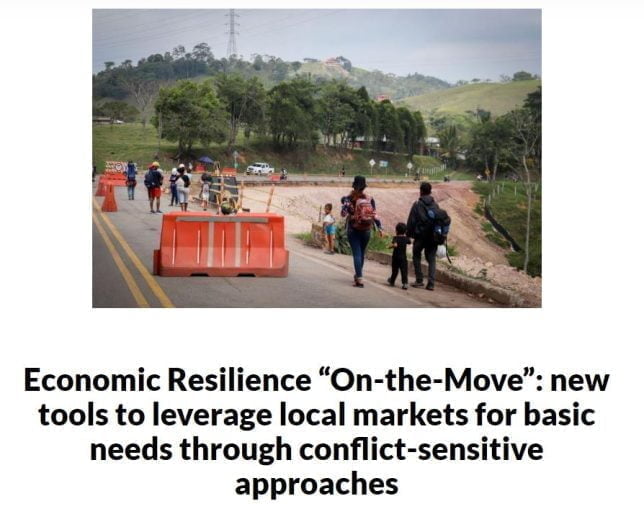
Economic Resilience “On-the-Move” – New Tools to leverage local markets for basic needs through conflict-sensitive approaches
Guidelines and Tools
See the publication here A special look at Cash and Local Markets for Social Cohesion Local market actors affected by (natural) disasters, pandemic lockdowns with movement restrictions and income loss – generally in Fragile Contexts – play a critical role in contributing towards communities’ basic...

Financial Services In The Uganda Refugee Response – An Assessment Of Users’ Perspectives
Report
This assessment of user experiences and perspectives on digital financial services and assistance mechanisms aims to inform actors in Uganda’s humanitarian response and other stakeholders. The data collected is representative at the settlement level for refugees and at district level for refugee hosting...

Uganda Refugee Response Cash And Voucher Assistance (CVA) User Perspectives – Research Brief
Report
This brief presents the summarised findings of the study on Financial Services and Humanitarian Mechanisms in the Uganda Refugee Response: An Assessment of User Perspectives in Uganda.
The assessment intends to inform actors and key stakeholders in Uganda’s refugee response about peoples’ existing...


